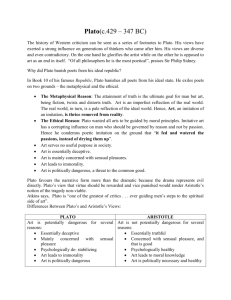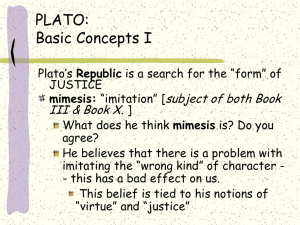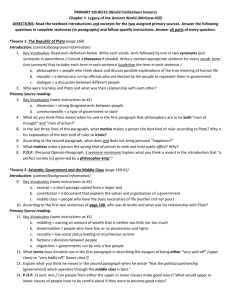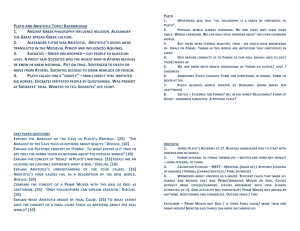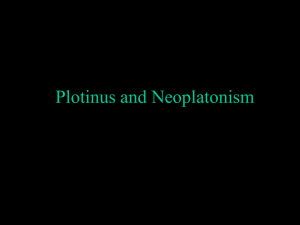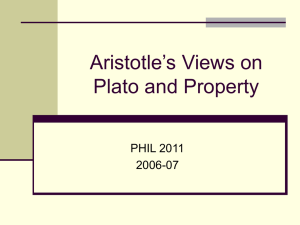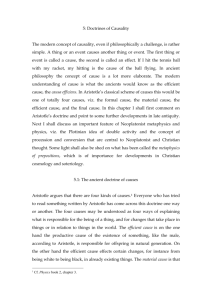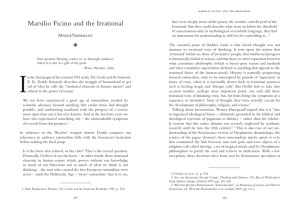Reading List - University of Warwick
advertisement
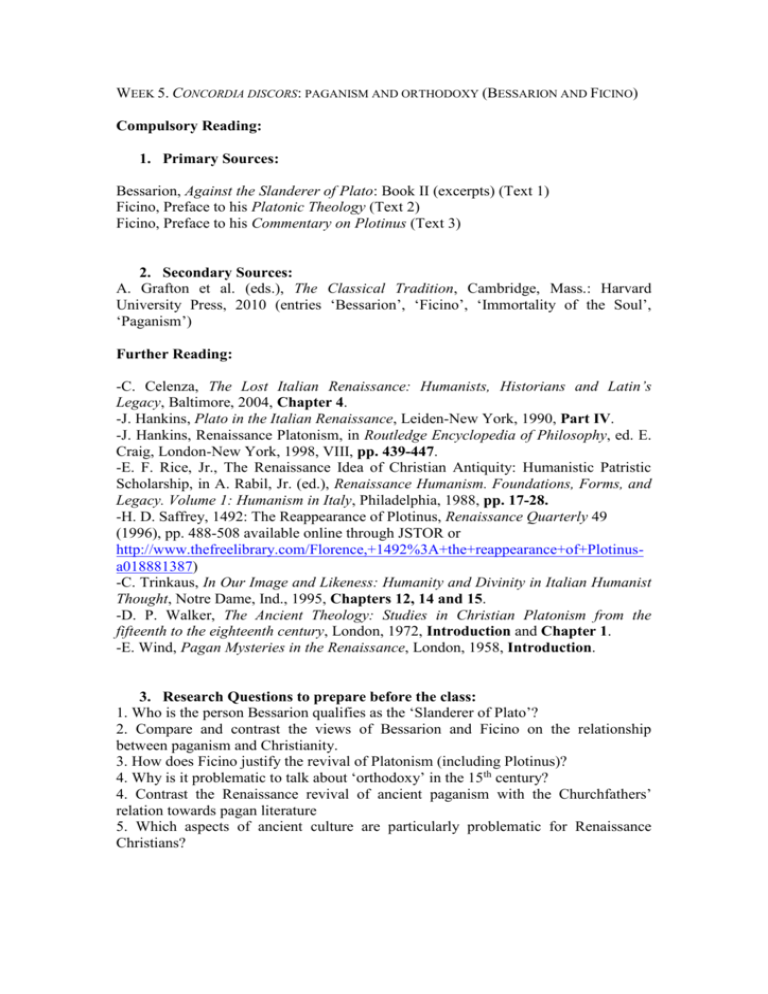
WEEK 5. CONCORDIA DISCORS: PAGANISM AND ORTHODOXY (BESSARION AND FICINO) Compulsory Reading: 1. Primary Sources: Bessarion, Against the Slanderer of Plato: Book II (excerpts) (Text 1) Ficino, Preface to his Platonic Theology (Text 2) Ficino, Preface to his Commentary on Plotinus (Text 3) 2. Secondary Sources: A. Grafton et al. (eds.), The Classical Tradition, Cambridge, Mass.: Harvard University Press, 2010 (entries ‘Bessarion’, ‘Ficino’, ‘Immortality of the Soul’, ‘Paganism’) Further Reading: -C. Celenza, The Lost Italian Renaissance: Humanists, Historians and Latin’s Legacy, Baltimore, 2004, Chapter 4. -J. Hankins, Plato in the Italian Renaissance, Leiden-New York, 1990, Part IV. -J. Hankins, Renaissance Platonism, in Routledge Encyclopedia of Philosophy, ed. E. Craig, London-New York, 1998, VIII, pp. 439-447. -E. F. Rice, Jr., The Renaissance Idea of Christian Antiquity: Humanistic Patristic Scholarship, in A. Rabil, Jr. (ed.), Renaissance Humanism. Foundations, Forms, and Legacy. Volume 1: Humanism in Italy, Philadelphia, 1988, pp. 17-28. -H. D. Saffrey, 1492: The Reappearance of Plotinus, Renaissance Quarterly 49 (1996), pp. 488-508 available online through JSTOR or http://www.thefreelibrary.com/Florence,+1492%3A+the+reappearance+of+Plotinusa018881387) -C. Trinkaus, In Our Image and Likeness: Humanity and Divinity in Italian Humanist Thought, Notre Dame, Ind., 1995, Chapters 12, 14 and 15. -D. P. Walker, The Ancient Theology: Studies in Christian Platonism from the fifteenth to the eighteenth century, London, 1972, Introduction and Chapter 1. -E. Wind, Pagan Mysteries in the Renaissance, London, 1958, Introduction. 3. Research Questions to prepare before the class: 1. Who is the person Bessarion qualifies as the ‘Slanderer of Plato’? 2. Compare and contrast the views of Bessarion and Ficino on the relationship between paganism and Christianity. 3. How does Ficino justify the revival of Platonism (including Plotinus)? 4. Why is it problematic to talk about ‘orthodoxy’ in the 15th century? 4. Contrast the Renaissance revival of ancient paganism with the Churchfathers’ relation towards pagan literature 5. Which aspects of ancient culture are particularly problematic for Renaissance Christians? Text 3: Ficino, Preface to the Commentary on Plotinus (1492), translated by H. D. Saffrey: “Great Cosimo, the Father of his Country by senatorial decree, at the time when a council was being negotiated among the Greeks and Latins in Florence under Eugenius IV, frequently heard a Greek philosopher by the name of Gemistus Plethon disputing like another Plato on the Platonic theology. From his fervid lips Cosimo was straightway so inspirited, so ensouled, that from that time forth he conceived deep in his mind a kind of Academy, to give birth to it at the first opportune moment. Then, while that great Medici was intending in some sense to give birth to the great thing he had conceived, he destined me, the son of his favorite doctor Ficino, while still a boy, to undertake the labor, educating me from that day forth to this very thing. Moreover, he labored that I should not only have all the books of Plato in Greek, but also the books of Plotinus. After this, in the year 1463, in the thirtieth year of my life, he commissioned me to translate first Thrice-Great Hermes, and thereafter Plato. Hermes I finished in a few months while Cosimo was still alive; Plato I had also begun at that time. Although he was also eager for Plotinus, he said nothing to me about translating it, lest he should appear to be weighing me down with too great a burden all at once. Such was Cosimo's kindness to his household, such was his discretion towards all, that I myself could hardly divine that he wished me to undertake Plotinus. However, as long as he was alive, Cosimo kept his desire to himself, but from heaven he expressed or rather inspired it. At the moment when I was giving Plato to the Latin world to read, Cosimo's heroic soul incited the heroic mind of Giovanni Pico della Mirandola in some unknown way, Pico himself almost did not know how, to come to Florence. Pico, born in the very year I was starting on Plato, and coming to Florence the same day, almost the same hour, I was publishing him, after greeting me asked me immediately about Plato. To him I said, our Plato has today emerged onto our thresholds. Then he heartily congratulated me on this, and straightway, and neither I nor he knows whence the words came, he led, or rather impelled, me to translate Plotinus. Surely a divine cause brought it to pass that the hero Pico should be born while Plato was being, as it were, reborn (Saturn being then in the house of Aquarius as it was when I was born thirty years previously) and that he should come to Florence on the very day our Plato was published, and that he should inspire me in a marvelous fashion with Cosimo's vow about Plotinus which had been quite hidden from me, but which was revealed by heavenly means to him. But since we have called upon divine providence in our philosophical task, it is worth examining it at greater length. In truth, we should not deem it possible by any other means than philosophy to appeal to men with a keen and somewhat philosophical turn of mind and to lead them towards perfect religion. Indeed, most people with a keen mind only accept the guidance of reason, and when it has been infused into them by a religious philosopher, they readily and promptly admit that there is such a thing as religiousness. And once they have had a taste of it, they pass on more easily to a better form of religion, which is common to all men. Consequently, it did not go against the design of providence, which was to appeal most wonderfully to all men according to their skills, that, in days of old, a certain type of religious philosophy should have come to life both among the Persians, thanks to Zoroaster, and among the Egyptians, thanks to Hermes, and that both should have shared the same ideas; then that it should have been put in the care of the Thracians, thanks to Orpheus and Aglaophemus; then that it should have grown up as an adolescent among the Greeks and the Italians, thanks to Pythagoras; and that, at last, it should have come of age in Athens, thanks to the divine Plato. It was common practice among the ancient Theologians to mask the divine mysteries either with mathematical numbers' and figures or with poetic fictions, so that there was no chance that it should be understood by just anybody. At last Plotinus unveiled theology; as testified by Porphyry and Proclus, he was the first and only one to probe most divinely into the secrets of the ancients, but owing to the incredible terseness of his style, the richness and depth of his meaning, his work requires, not only a translation, but also some commentary. As for us, we have tried to reveal and to explain the impact of the above mentioned Theologians in the works of Plato and Plotinus, so that the poets may cease in an impious manner to introduce the events and mysteries of religion into their fables and so that the horde of Peripatetics, that is to say nearly all philosophers, may be warned that they should not mistake this religiousness for an old wives' tale. Indeed, nearly all the world is inhabited by the Peripatetics and divided into two schools, the Alexandrists and the Averroists. The first ones believe that our intellect is mortal, whereas the others think it is unique: both groups alike destroy the basis of all religion, especially because they seem to deny that there is such a thing as divine providence towards men, and in both cases they are traitors to Aristotle. Nowadays, few people, except the great Pico, our companion in Platonism, interpret the spirit of Aristotle with the same reverence as was shown in the past by Theophrastus, Themistius, Porphyry, Simplicius, Avicenna, and more recently Plethon. If there be some who believe that an impiety so common and upheld by such sharp minds can be erased from the hearts of men merely by preaching faith to them, there is no doubt that the facts themselves will prove that they are very far from the truth: a much greater power is needed, namely some divine miracles, acknowledged as such everywhere, or at least some sort of philosophical religion that will convince the philosophers open to its teachings. Today, the will of divine providence is that this genus of religion should be confirmed by the authority and the reasoning of philosophy, whereas at an appointed time the truest species of religion will be confirmed by miracles acknowledged by all nations, as was once the case in the past. So, under the guidance of divine providence, we have interpreted the divine Plato and the great Plotinus. As regards Plato [he is addressing Lorenzo de' Medici] we sent him to you a long time ago, so that, in a way, he could live again in your person, in whom Cosimo is also alive; and being born again, he grew up as we had hoped he would, and now he is happily thriving as an adult. As for Plotinus, even though it would be only natural that I should send him to you, it so happens that I do not need to do so, for I can see him hurrying towards your palace of his own will, as if he were attracted by Plato himself, just as iron is attracted by a magnet, in order to lead a happy life with his Plato and close to you, Lorenzo il Magnifico, the only patron of belles-lettres. You will listen to Plotinus as he discusses the mysteries of philosophy with Plato in your own home, but before you hear him, you will have to listen to Porphyry, his faithful disciple, who relates his life, all the habits and manners of his master, in a condensed yet authentic manner. Our dear Poliziano, your friend, a man of acuity, believes that this Life of Plotinus is as literary as it is philosophical, and that consequently you will enjoy it. Finally, do not only listen to them with a happy ear, but be perfectly happy all through your life. And, dearest Lorenzo, I entreat you to love, as much as you love me, our dear Valori, by whom I mean Filippo, a remarkable man who studies the wisdom of Plato and loves you dearly.



